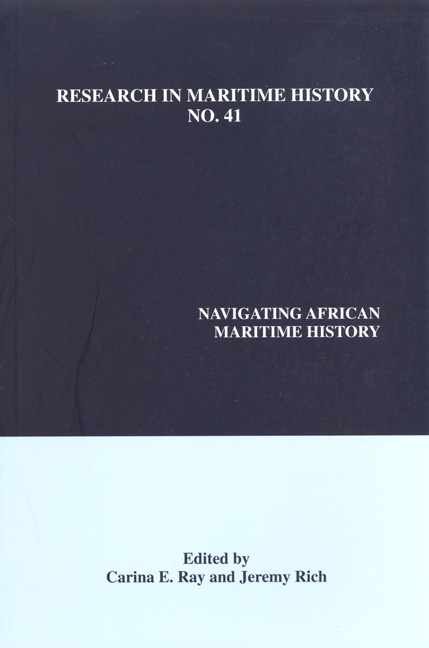Book contents
- Frontmatter
- Table of Contents
- About the Editors
- Contributors' Notes
- “Introduction: Charted Routes and New Directions in the Study of Africa's Maritime History”
- “Austronesian Mariners and Early Trans-Indian Ocean Crossings”
- “Eight Hens per Man per Day: Shipwreck Survivors and Pastoral Abundance in Southern Africa”
- “State Control and Regulation of Commerce on the Waterways and Coast of Senegambia, ca. 1500-1800”
- “Swimming, Surfing and Underwater Diving in Early Modern Atlantic Africa and the African Diaspora”
- “Rough Sailing: Risks and Opportunities for Immigrant African Maritime Workers in Gabon, ca. 1860-1914”
- “Desertion, Dereliction and Destitution: The Travails of Stranded West African Seamen in the United Kingdom, ca. 1921-1934”
- “‘The White Wife Problem:’ Sex, Race and the Contested Politics of Repatriation to Interwar British West Africa”
- “Sailing Beyond Apartheid: The Social and Political Impact of Seafaring on Coloured South African Sailors”
“Introduction: Charted Routes and New Directions in the Study of Africa's Maritime History”
- Frontmatter
- Table of Contents
- About the Editors
- Contributors' Notes
- “Introduction: Charted Routes and New Directions in the Study of Africa's Maritime History”
- “Austronesian Mariners and Early Trans-Indian Ocean Crossings”
- “Eight Hens per Man per Day: Shipwreck Survivors and Pastoral Abundance in Southern Africa”
- “State Control and Regulation of Commerce on the Waterways and Coast of Senegambia, ca. 1500-1800”
- “Swimming, Surfing and Underwater Diving in Early Modern Atlantic Africa and the African Diaspora”
- “Rough Sailing: Risks and Opportunities for Immigrant African Maritime Workers in Gabon, ca. 1860-1914”
- “Desertion, Dereliction and Destitution: The Travails of Stranded West African Seamen in the United Kingdom, ca. 1921-1934”
- “‘The White Wife Problem:’ Sex, Race and the Contested Politics of Repatriation to Interwar British West Africa”
- “Sailing Beyond Apartheid: The Social and Political Impact of Seafaring on Coloured South African Sailors”
Summary
Charted Routes: A Review of African Maritime Historiography
What does maritime history look like in an African setting? What insights can African case studies offer to the rapidly expanding field of maritime history? These questions inspired the authors of the essays in this collection to travel the often-neglected waters of African maritime history. Despite the rise of European, Asian and American historical research linked to seas and rivers, Africanists have rarely identified themselves as maritime researchers. More than two decades ago, the French scholar Jean-Pierre Chauveau tellingly entitled his literature review of maritime topics in Africa, “Is an African Maritime History Possible?” While he focused particularly on the West African Atlantic coast, his observations about the lack of scholarly attention to fishing, navigation and littoral communities still largely apply to the continent as a whole. Two years before Chauveau's 1986 critique, a group of scholars convened at the University of Aberdeen at a conference dedicated to African maritime issues. Africa and the Sea, the published collection of papers presented at the conference, remains the only anthology of studies on African maritime history in English.
Despite the limited research on Africa that identifies itself as maritime, there is no question that river and ocean travel have been ubiquitous in the history of the continent. The Atlantic and Indian oceans carried slaves, valuable natural resources, invading colonial armies and a wide range of cultural practices to and from different parts of Africa for centuries. From the anonymous Greek author of the Periplus of the Erythrean Sea onward, written sources testify to the importance of water travel in African societies. World historians have long pointed to the voyages of Arab traders and to Chinese fleets under commanders such as Zheng He during the Ming dynasty to East Africa, as well as the efforts of Portuguese navigators to visit the African coast. The voluminous literature on the Indian Ocean slave trade testifies to the importance of oceans and rivers in African history as highways of trade, people and ideas. A great deal of research has also investigated the slave trade between East Africa and other parts of the Indian Ocean world.
- Type
- Chapter
- Information
- Navigating African Maritime History , pp. 1 - 18Publisher: Liverpool University PressPrint publication year: 2009



